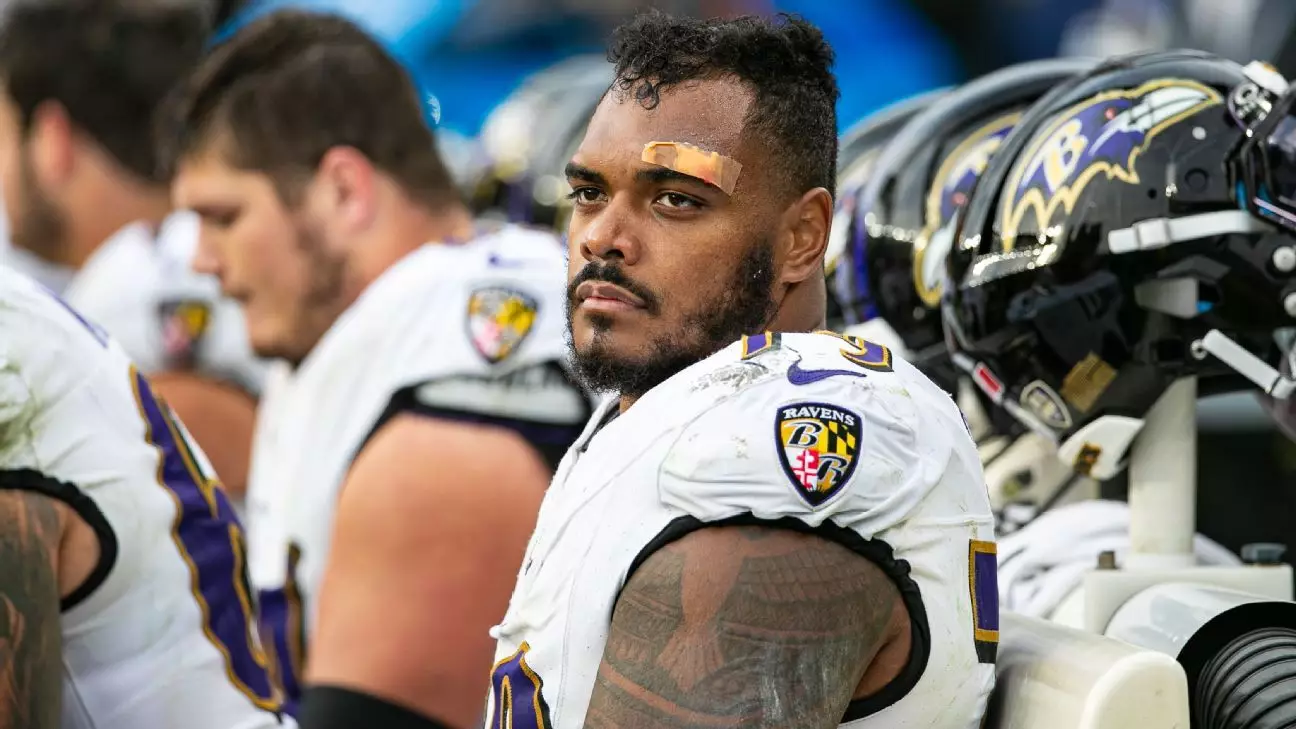In an age where professional athletes often prioritize financial gains over allegiance to their teams, Ronnie Stanley stands apart. The former No. 6 overall pick in the 2016 draft opted to re-sign with the Baltimore Ravens rather than glimpsing what free agency had to offer. His three-year, $60 million deal, while team-friendly, embodies a sense of loyalty that seems to be fading within sports culture. By choosing to stay with the Ravens, Stanley conveyed a keen understanding of both his value as a player and his commitment to the franchise that nurtured his career from its inception.
Stanley’s comments illuminate an essential nuance of athlete contracts: financial security versus a genuine connection with a team. “I knew I was going to give Baltimore the best bargain that I would offer to any other team,” he explained. Such statements suggest a deeper appreciation for loyalty, recognizing the Ravens not only as an employer but as a foundational pillar that supported his career development. Rather than engaging in a bidding war, he decided that staying with the Ravens outweighed the prospects of securing a higher paycheck elsewhere.
A Complicated Contract Landscape
The competitive nature of the NFL means that contracts can often lead to complicated narratives. In this instance, Stanley’s contract saga involves more than just numbers. After taking a significant pay cut last season, reducing his salary by $7.5 million, Stanley had maneuvered himself into a precarious position yet managed to balance team needs with personal expectations. His decision to re-sign just days before the negotiating period emphasizes the fluid dynamics of player contracts while showcasing his ability to collaborate with the Ravens.
As reported, if Stanley had entered free agency, teams like the New England Patriots and Washington Commanders would have likely pursued him aggressively. His decision to remain in Baltimore—albeit at an average annual salary of $20 million—highlights a growing trend in sports: players feeling satisfied with contributions that don’t strictly revolve around exorbitant contracts. By taking a middle ground, Stanley helps the Ravens navigate their cap issues while ensuring his own financial wellbeing.
Legacy and Leadership on the Line
It’s worth noting that Stanley isn’t just another player on the Ravens’ roster; he is a veteran leader, setting an example for younger teammates. As a two-time Pro Bowler and Baltimore’s first All-Pro left tackle since the legendary Jonathan Ogden, Stanley’s role is pivotal both on and off the field. His leadership, underscored by a solid performance during the past season—ranking 12th in pass block win rate among tackles—gives the Ravens a crucial asset in their quest for success.
Stanley’s commitment to the Ravens echoes not just in his contractual decisions but also in his reflections on the team’s past playoff performances. His recollection of the heartbreaking 27-25 loss to the Buffalo Bills carries the weight of an athlete who relishes the journey as much as the destination. “That just sticks with you for a while, maybe even a lifetime,” he said, encapsulating the ethos that transcends the game. This insight underscores the emotional investments that players make, reminding us that victories make headlines, but defeats can linger in the heart.
In Search of Collective Success
The Ravens’ ambitions are clear: they want to evolve into a Super Bowl contender. Stanley’s acknowledgment of the importance of collective achievements over individual statistics or accolades helps to strengthen team morale. “We’ve broken so many records in the last however many years—I don’t think we really care about it, to be honest,” he noted. This statement signifies a mature perspective within the locker room, one that resonates with the agony and ecstasy of competing at the highest levels.
In a climate where discussions often revolve around individualism and personal gain, Stanley’s recent contract renewal serves as a poignant reminder that the fabric of any successful sports team is woven with loyalty, shared aspirations, and mutual respect. His actions, driven by a sense of duty towards the Ravens, reflect a fundamental principle: the sum of a team’s parts can, in essence, define its identity. As the Ravens look toward the future, it appears they have not only retained an elite athlete but also a steadfast leader committed to achieving greatness together.


Leave a Reply